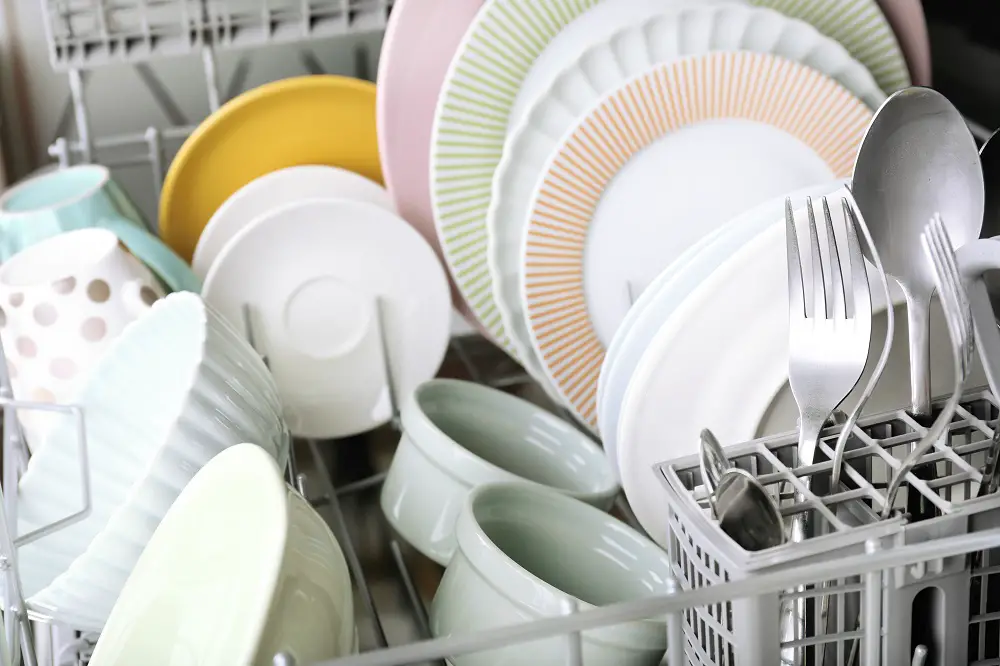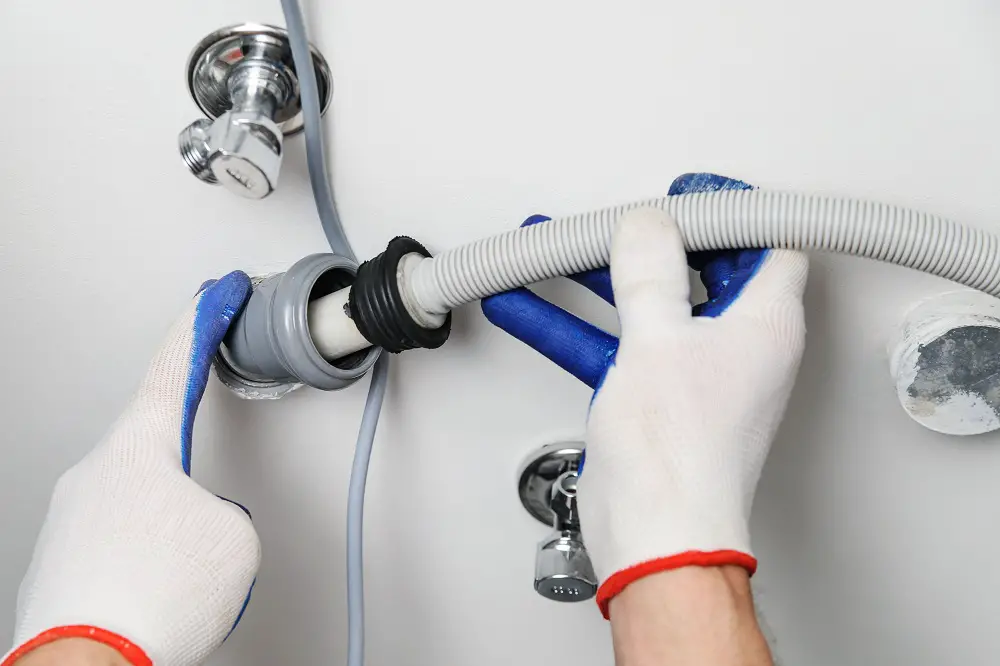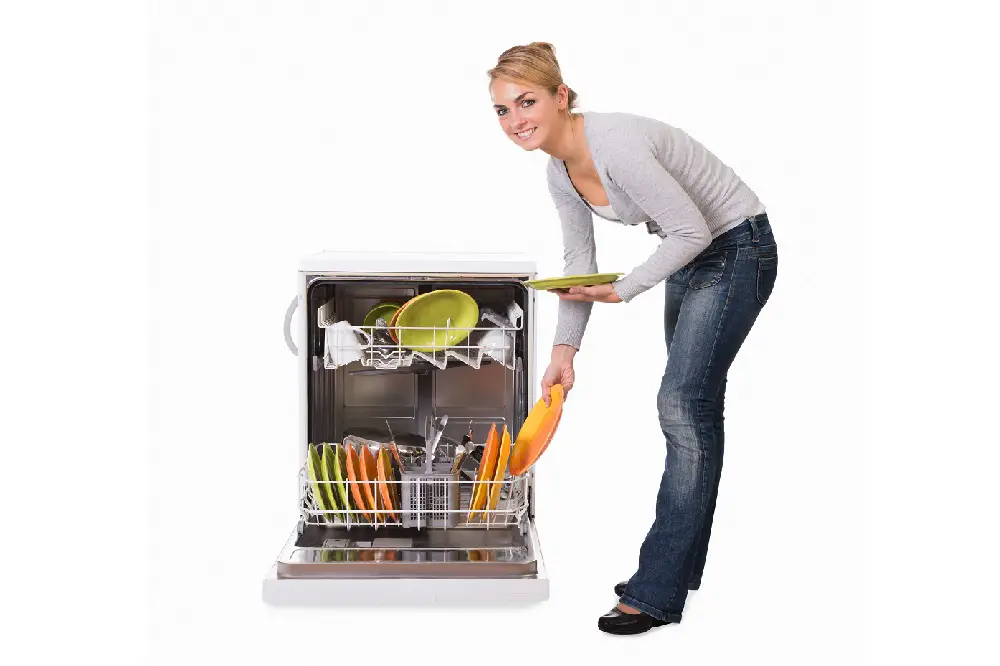Dishwashers use hot water to clean your dishes thoroughly. But there’s always confusion about whether you must use hot or cold water for your portable dishwasher.
Most portable dishwashers have a heating element that can raise the water temperature (for a cold water connection). For models that don’t have this feature, it would be best to connect the inlet hose to a hot water source.
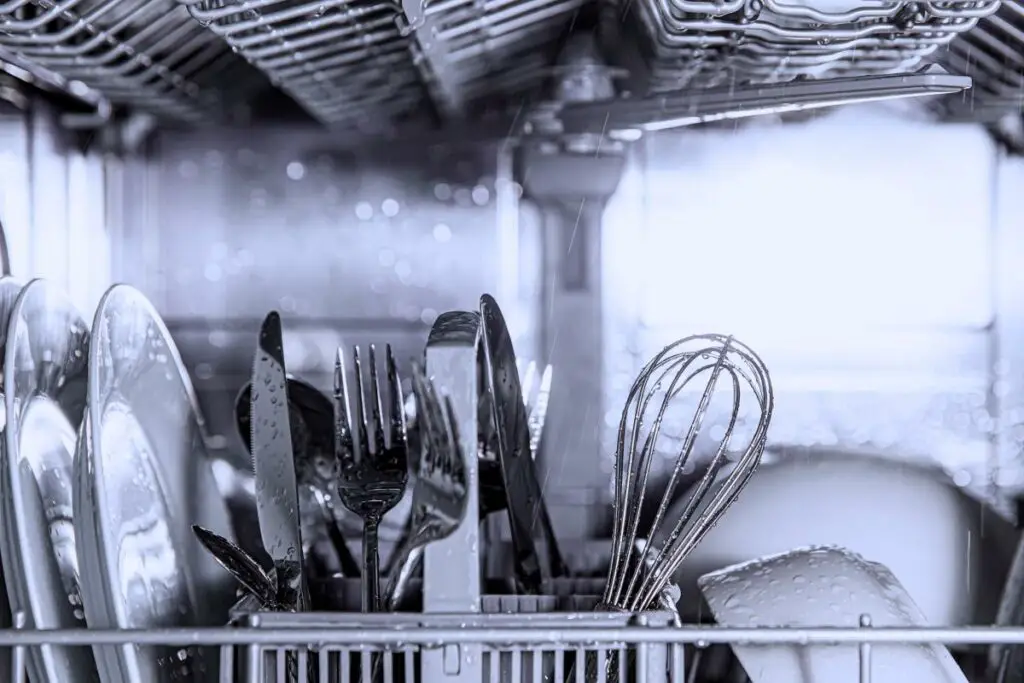
If your countertop or free-standing dishwasher does have a heating element, can you hook it up to a hot water supply? Or should you use only cold water? This guide will provide you with answers to these questions and all related information.
Table of Contents
Do Portable Dishwashers Need Hot Water?
Most portable dishwashers need hot water for cleaning and sanitizing dirty dishes. It can be provided via a hot water connection or from an internal heater element.
The ideal water temperature for a dishwasher’s wash cycle is at least 120oF.
The heat helps remove residual food particles, grease, and soap sediments more effectively than cold water.
Running a dishwasher model with cold water won’t clean your dishes well since it isn’t effective for removing residue and grease from dishes and glasses, as well as hot water.
Exception #1: Special Detergents
However, if you’re using a detergent (liquid or powder) that works well in cold temperatures, it’s advisable to use only cold water to save energy and lower costs. If your dishwasher has the automatic heating feature, ensure you select cold water temperature settings before you run the cycle.
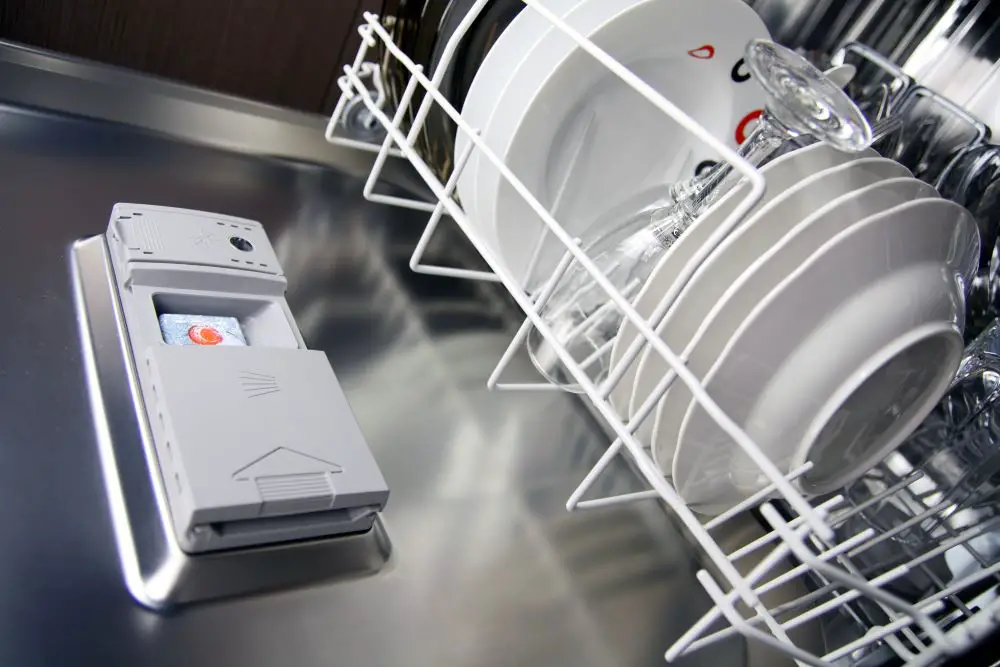
Yet, normal detergents and additives are more efficient with hot water. They are formulated to work best and effectively clean dishes at high temperatures.
If you are unsure about your detergent, expect it to be a hot water one unless it’s clearly named otherwise.
Exception #2: Portable Dishwashers With Heaters
Portable dishwashers that can heat their own water don’t need a hot water connection. Such dishwashers are beneficial, especially if you have access only to cold water.
When you start the wash cycle in your dishwasher, water flows into the appliance’s tub, where a heating element raises the temperature to suit the selected option.
The appliance will only heat the amount of water required to the correct temperature for different options and wash cycles. However, you can still use hot water with such dishwashers. The internal heating may be obsolete for the cycle and save energy.
A hot water connection (a sink faucet or an external hot water supply line) is recommended for models without heating elements.
Consult the user manual to know your appliance’s water temperature settings and recommended detergent.
Hot or Cold Water for Portable Dishwashers
While you can use hot or cold water for your portable dishwasher, each has its advantages. Here are the benefits of each to help you decide which is more suitable for your use:
Hot Water Advantages
Dishwashers are meant to operate with hot water for maximum cleaning efficiency. There are several advantages of using hot water for your portable dishwasher:
Reduced Cycle Time
Typically, a dishwasher takes one or two minutes to heat the water inside the appliance by one degree. Most dishwashers heat the water between 120o-145oF for the main wash cycle and 140o-155oF for the final rinse.
If you provide a hot water inlet to the dishwasher, the time it takes to heat the water inside its tub will be reduced (when compared to using cold water).
Hence, the overall wash cycle duration will also decrease.
Sanitization
The bacteria and germ buildup on your dishes (especially if you wash your dirty dishes once every few days) can only be rid of by using hot water.
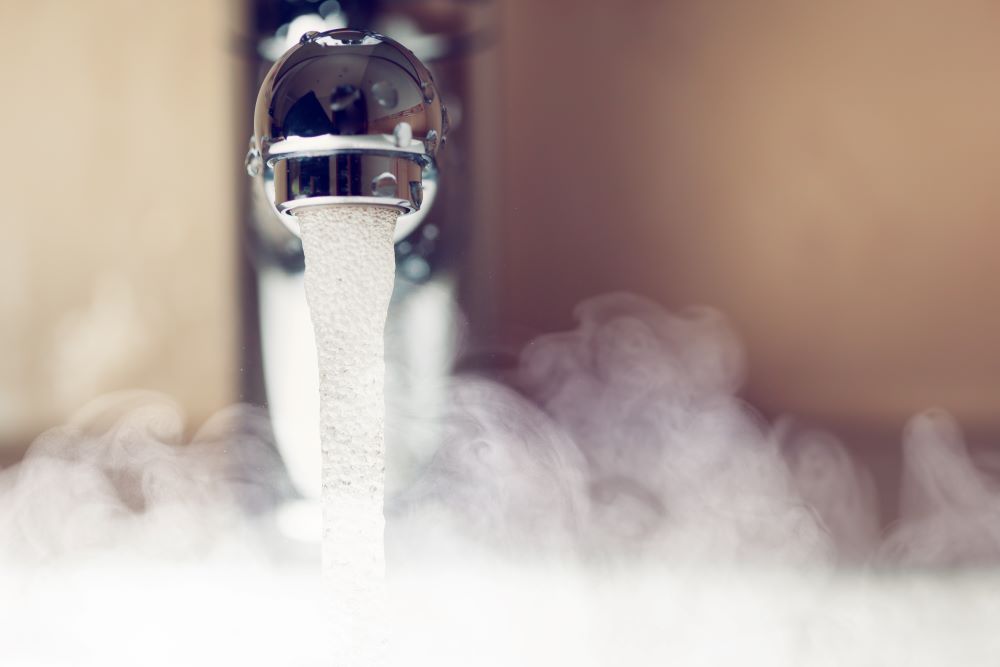
The purpose of dishwashers is not only to clean the dishes but also to sanitize them. While hot and cold water can wash off grease and residual food from your kitchenware, only hot water can sanitize it.
Stain and Residue Removal
Hot water works well to remove regular and stubborn stains and food residue.
If you load dirty dishes in your portable dishwasher and run the wash cycle once every couple of days (until it’s a full load), stains and residue tend to dry out. These are hard to remove, and only hot water can get these out effectively.
Cloudy Stains
When you use detergent or detergent pods, hot water helps rapidly dissolve them without leaving behind any cloudy stains (compared to cold water).
HE detergents, made for maximum cleaning efficiency in modern portable dishwashers, work best only with hot water. Unless the detergent’s use instructions specifically mention using only cold water, the efficiency is improved with hot water.
Viscosity
Some food items with a lot of fat or sugar content tend to stick to your dishes. The viscosities of such substances decrease when you wash these dishes with hot water.
Instead, cold water will increase the viscosities, tighten them, and make it difficult to wash them off your dishes or vessels.
Cold Water Advantages
While you could use cold water with your portable dishwasher, despite the limited advantages, it won’t wash dishes as well as hot water.
Here are some of the advantages of using cold water for your portable appliance:
Reduced Energy Costs
Supplying your portable dishwasher with cold water will reduce the energy cost for each load. Selecting the cold setting for appliances with a heating feature will prevent them from heating the water and help save energy costs.
Considering dishwashers use about 75-90% of the energy to heat the water, this will result in considerable savings.
Suitable for Certain Detergent Types
Some detergents and liquid soaps have enzymes active in as low as 60oF water temperatures. Cold water works perfectly well with such detergents in your dishwasher for effectively washing dirty dishes.
Installation and Connection
Before connecting your portable dishwasher to a hot water supply, refer to the instruction manual. Avoid using hot water if it explicitly mentions connecting the inlet hose only to a cold supply.
If you’re connecting your dishwasher to a hot water faucet, it would be best to use a hot water-fill hose instead of the regular cold water hose. While you can go with a universal faucet adapter, you can also check for a hot water adapter designed to handle hot water.
Consider converting your portable dishwasher connections to permanent fittings with a dishwasher installation kit. Use a tee fitting between the hot water shutoff valve under the sink and the flex line to the sink faucet. You can connect the steel braided line of the dishwasher to the third tee connection.
Energy Consumption and Efficiency
While it may seem like using hot water for your dishwasher is more efficient than cold water, most manufacturers recommend using cold water.
Countertops use about 150 kWh/year, and free-standing models use about 200 kWh/year.
Dishwashers use 75-90% of the energy to heat the water. And it takes about 1-2 minutes to raise the temperature of the water by one degree.
Considering water heaters running at about 1500 W, the minimal annual energy consumption lies between 400-550 kWh.
As evident from the energy consumption statistics, letting dishwashers heat their water is more efficient than using water heaters to provide the hot water.
Besides, dishwashers only heat as much water as needed for the wash and rinse cycles. In contrast, water heaters heat their entire capacity worth of water.
The only setup where it’s beneficial to use a hot water inlet for your dishwasher is if you have solar-powered water heating. Such a setup would be more energy-efficient overall.
You should also read our article answering the question if Portable Dishwashers Are Worth It?
Recommendations and Best Practices
Here are some things to keep in mind to help keep your dishes and your dishwasher in good condition for longer:
- Avoid loading heat-sensitive items in your dishwasher (especially thin plastic materials) since hot water can damage such things.
- Perform a deep cleaning of your dishwasher once a month to remove hard water stains and residual remains. If you have hard water, the high heat causes limescale formation inside the appliance.
- If you’re using a hot water inlet, ensure the temperature is about 130oF.
- Avoid using water above 140oF since the detergent’s enzymes die off too quickly beyond this temperature, and it might cause damage to the appliance.
- Run hot water in your sink before connecting the dishwasher’s inlet hose to the faucet to ensure no initial cold water gets into the machine.
- Avoid using excess detergent in your appliance; hot water will mix with the detergent to create excessive soap suds requiring extra rinse cycles or not getting rinsed thoroughly.
Conclusion
Dishwashers are most efficient in cleaning dirty loads of dishes with hot water. Cold water in the dishwasher isn’t generally recommended since cold water washing is less effective than hot water.
Most portable dishwashers have a heating element to heat the water. You can use such models with a cold or hot water supply.
However, for the models that don’t have the feature, provide a connection to an external hot water source, like a sink faucet or external hot water supply line. Consider setting your water heater temperature to about 130oF, ideal for dishwashers that can’t heat water.
